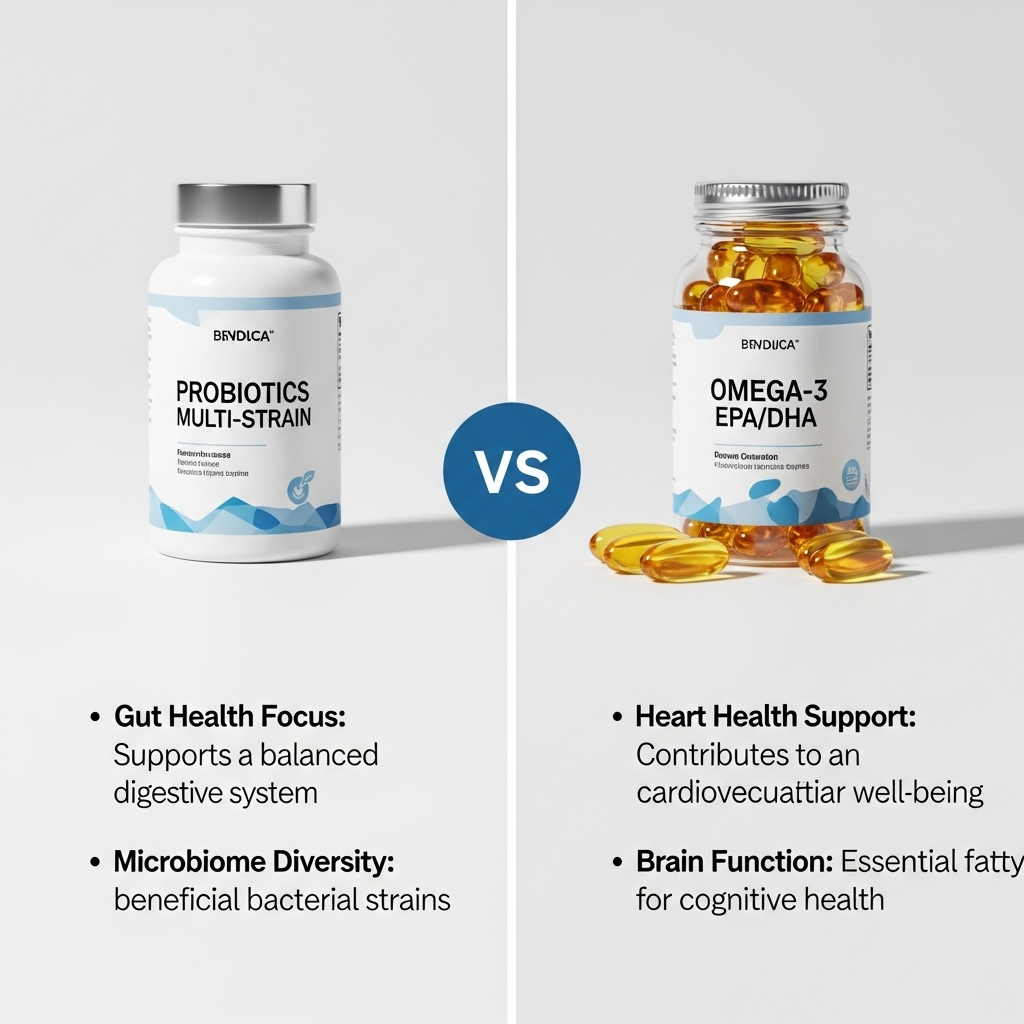Dietary supplements > Probiotics (Multi-Strain) vs. Omega-3 Fatty Acids (EPA/DHA)
Probiotics and Omega-3 fatty acids are popular supplements, each offering distinct health benefits. Understanding their specific roles is crucial for making informed decisions about your health regimen.
This comparison analyzes real-world performance, user feedback, and key differentiators to help you make an informed decision.
Quick Verdict
If digestive health is your primary concern, multi-strain probiotics are the better choice. For those prioritizing heart and brain health, omega-3 fatty acids provide more targeted benefits.
- Multi-strain probiotics are tailored for gut health, offering relief from digestive discomfort and promoting a balanced gut microbiome.
- Omega-3 fatty acids are essential for heart and brain health, supporting cardiovascular function and cognitive well-being.
Who Should Choose Which?
Choose Probiotics (Multi-Strain) if:
Individuals experiencing digestive issues like bloating, constipation, or diarrhea, or those seeking to improve their gut microbiome.
Choose Omega-3 Fatty Acids (EPA/DHA) if:
Individuals looking to support cardiovascular health, improve cognitive function, or reduce inflammation.

Key features – Side-by-Side
| Attribute | Probiotics (Multi-Strain) | Omega-3 Fatty Acids (EPA/DHA) |
|---|---|---|
| Primary Benefit | Gut Microbiota Balance & Digestive Support | Cardiovascular & Cognitive Health |
| CFU Count/EPA-DHA Dosage | 1-50 Billion CFUs (Varies by Brand) | Varies; e.g., PEScience: 440mg EPA, 240mg DHA |
| Strain Diversity/Omega-3 Source | Multiple Strains (e.g., InnovixLabs: 31 Strains) | Fish, Algae, Flaxseed (ALA) |
| Third-Party Testing | Yes (e.g., Eurofins for InnovixLabs) | Yes (e.g., IFOS, USP, NSF International) |
| Digestive Benefits | Reduces bloating, constipation, diarrhea; improves regularity | Influences inflammation, gut microbiota, and immune responses |
| Cognitive Benefits | May improve memory, problem-solving, and attention | Vital for brain health, memory, and blood flow |
Overall Comparison
Pros and Cons
Probiotics (Multi-Strain)
- May improve gut microbiota balance
- Aids digestion
- Alleviates digestive issues like bloating, constipation, and diarrhea
- May reduce inflammation in the gut
- May improve bowel regularity
- Can help manage cholesterol levels, blood pressure, and inflammation
- May improve cognitive function, memory, problem-solving skills, and selective attention
- Available in easy-to-swallow capsules or tablets
- Some do not require refrigeration
- Some are free of artificial ingredients, fillers, and common allergens
- No major disadvantages reported.
Omega-3 Fatty Acids (EPA/DHA)
- May help with digestion, particularly in conditions like ulcerative colitis or Crohn's disease.
- May lower triglyceride levels, raise HDL (good) cholesterol, and lower blood pressure.
- Vital for brain health, including memory, cognitive well-being, and blood flow in the brain.
- Some products are designed to minimize fishy aftertaste (e.g., PEScience Omega-3+ is burp-friendly with no fishy aftertaste).
- Algae oil is a sustainable, vegetarian option.
- May interact with anticoagulant and antiplatelet drugs, potentially increasing the risk of bleeding.
- May interact with blood pressure medications and contraceptive drugs.
- Some products may contain allergens or artificial ingredients.
User Experiences and Feedback
Probiotics (Multi-Strain)
- Helps alleviate bloating and digestive discomfort
- May notice a reduction in bloating and digestive discomfort within the first few days
- No major complaints reported.
- No value feedback reported.
- Some users have reported a reduction in bloated belly
- Some users reported no more discomfort after meals
Omega-3 Fatty Acids (EPA/DHA)
- No highlights reported.
- No major complaints reported.
- No value feedback reported.
Frequently Asked Questions
Can I take both probiotics and omega-3 fatty acids?
Yes, they address different aspects of health and can be taken together. Consult with a healthcare professional for personalized advice.
Are there any side effects?
Probiotics may cause mild digestive upset initially. Omega-3s may interact with blood thinners. Always follow recommended dosages and consult with your doctor.
Sources & Citations
- Official product specifications
- Expert reviews from tech publications
- User feedback from online forums
Information gathered through AI-assisted web search and analysis. Last updated: October 2025
Methodology & Transparency
Our comparison methodology combines multiple data sources to provide comprehensive, unbiased analysis:
- Data Collection: We gather information from official specifications, user reviews, and independent testing
- AI-Assisted Analysis: Advanced AI helps process large amounts of data while maintaining accuracy
- Human Oversight: All comparisons are reviewed for accuracy and relevance
- Regular Updates: Content is refreshed to reflect new information and user feedback
- Bias Mitigation: We strive for objectivity by considering multiple perspectives and sources
Versusly.ai uses AI-assisted content generation combined with human oversight to deliver comprehensive comparisons. We are transparent about our process and continuously work to improve accuracy and usefulness.